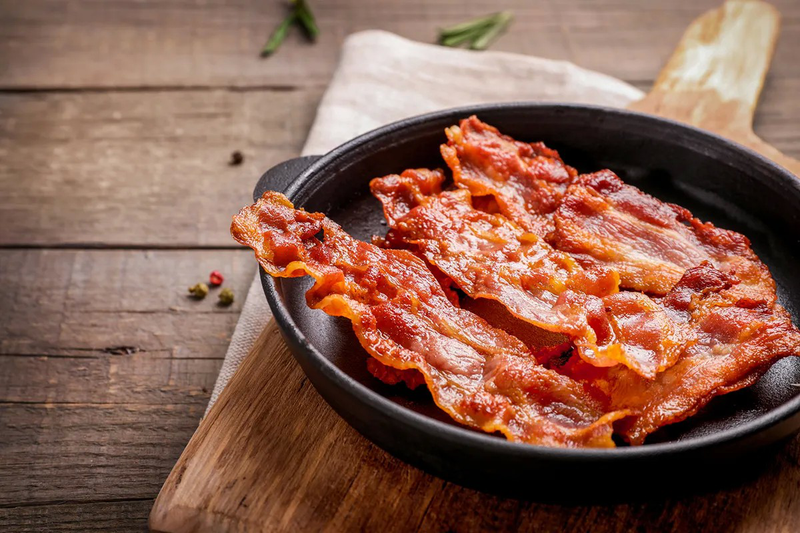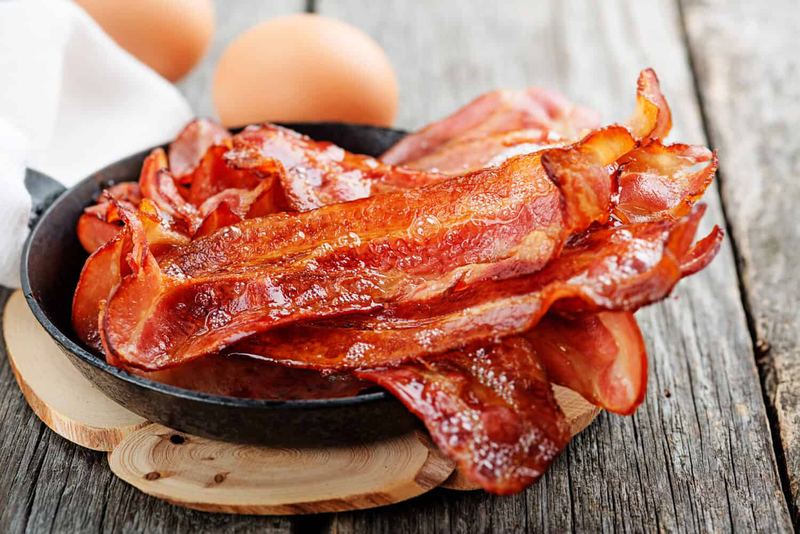Originating from the need to preserve food in ancient times, people came up with the idea of salting and smoking to prolong the shelf life of meat. With its delicious and attractive flavor, bacon is often used to eat with bread, salad or simply as a fast food. However, some opinions are still concerned about this dish and put it on the list of foods that should be “limited” because of its high fat content. So how many calories are in bacon?
Bacon (also known as smoked meat) is meat that has been processed through the smoking process, to preserve and create a characteristic flavor. This process often uses wood such as: Pine, oak, or fruit trees to create smoke, thereby preserving the meat longer and having a rich flavor. Bacon can be made from many different types of meat such as: Pork, beef, or chicken.
Nutritional Value of Bacon
Informed about the nutritional value of bacon will help you answer the question of how many calories are in bacon? Meat is a nutritious food, and bacon is no exception. In 100 grams of cooked bacon, there are impressive nutritional components such as:
- 37 grams of high-quality animal protein.
- B vitamins, including: B1, B2, B3, B5, B6, B12.
- 89% RDA of selenium (recommended daily intake).
- 53% RDA of phosphorus.
- High content of essential minerals such as: Magnesium, iron, zinc, and potassium.

Bacon is a food rich in vitamins and minerals.
Vitamins and minerals such as: B6, B12, niacin, thiamine, riboflavin, iron, magnesium, potassium and zinc are all found in bacon in high amounts. It can be seen that this is a food that not only provides energy but also brings many essential nutrients to the body.
How many calories in bacon?
How many calories in bacon? Bacon is generally very rich in nutrients. Specifically, on average, 100 grams of bacon contains 140 calories (equivalent to a cup of low-fat milk or two small slices of whole-wheat bread). More specifically:
- The most popular type is bacon from pork, which has a high fat content, so the calories are also high, ranging from 350 to 400 calories per 100g.
- Chicken bacon is usually lower in calories, about 200-250 calories per 100g. This type is suitable for those who want to reduce calories but still love bacon.
- Smoked beef is also a popular choice, with about 300-350 calories per 100g.
Many scientific studies show that bacon is one of the foods rich in nutrients, beneficial for health and these are essential nutrients to supplement in the daily diet.

How many calories are in bacon depends on many factors.
Is bacon good for your health?
In addition to how many calories are in bacon? Is eating bacon good for your health? Many people are also interested. In fact, bacon is processed and cooked without using oil, even helping to reduce the amount of natural fat in food.
If you choose quality products from reputable sources, bacon can bring health benefits. Bacon brings certain health benefits, including:
- Providing energy: Bacon contains B vitamins, supporting the process of converting food into energy and contributing to the creation of red blood cells.
- Supporting mood: Choline in bacon plays an important role in regulating mood and muscle function.
- Rich in nutrients: Bacon provides many nutrients such as: Selenium, phosphorus, iron, magnesium, zinc, potassium and vitamins.
According to nutritionists, each person should only eat bacon 2-3 times a week. To balance nutrition, bacon should be combined with green vegetables and fruits. A great idea is to prepare a salad with bacon, which is a delicious and nutritious snack for the body.

Adding bacon has certain health benefits, but you shouldn’t eat too much.
The Health Effects of Bacon
Is eating a lot of bacon harmful to your health? The question of the benefits and harms of bacon is currently causing many conflicting opinions. Some information shows that this dish can be harmful to your health if you consume it incorrectly.
Regarding the risk of cancer
- According to the World Health Organization (2015), bacon and other processed meats are classified as “group 1 carcinogens”.
- PAH (polycyclic aromatic hydrocarbons) can appear during processing.
- Nitrosamines, a carcinogen, can form when meat is processed at high temperatures. However, modern production methods have significantly reduced this content.
Increased risk of stroke
- Bacon contains 50% monounsaturated fat, 40% saturated fat, and a significant amount of cholesterol (22mg – 40mg/100g).
- High consumption of saturated fat may be linked to heart disease and stroke, but small portions and occasional consumption are unlikely to have any effect.

Eating bacon may increase the risk of stroke
Increases blood pressure, affects overall health
The amount of sodium in bacon ranges from 280mg – 600mg/100g, which can increase blood pressure or the risk of stomach cancer in sensitive people.
Cooking meat at too high a temperature or burning meat can create toxic compounds such as: PAH, heterocyclic amines.
Notes when using bacon to avoid affecting health
Bacon is an attractive dish but needs to be used properly to protect health. Here is an important point that you need to pay attention to:
- Limit consumption: Bacon contains a lot of salt and fat, which can increase the risk of cardiovascular disease and diabetes if eaten too much.
- Choose quality products: You should choose bacon from reputable manufacturers to ensure that it does not contain harmful preservatives and additives.
- Combine with a healthy diet: Add more green vegetables and fruits to balance nutrition and reduce the negative effects of bacon.
- Proper preparation: Avoid grilling or frying bacon at too high a temperature to minimize the formation of carcinogens.
- Check the expiry date: Always check the expiry date and store bacon properly to avoid food poisoning.

Note when eating bacon to avoid health effects
Here is some information to help you answer: How many calories are in bacon? Bacon is a nutritious food but also contains a lot of calories and fat. Understanding the nutritional composition and how to use it properly will help you enjoy this dish safely. You should balance your portions and combine it with other foods in your diet to avoid affecting your health.





